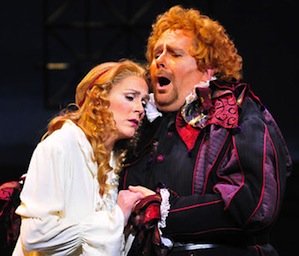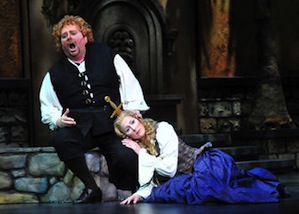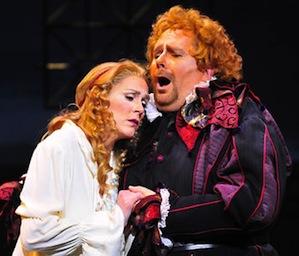
Photos by Barry Wisdom
Some opera companies that return to producing full-length operas after a crisis or shortened season look into the future. Others look into the past. The Sacramento Opera, in making its long-awaited return to producing full-length operas, chose the latter on Friday evening with a tastefully delivered, if less than captivating, performance of Verdi’s Rigoletto.
The company had not produced a full-length opera since it offered Handel’s Orlando in November 2010. Soon after, a budgetary shortfall forced it to cancel the two remaining operas of its 2011–2011 season: The Magic Flute and The Postman Always Rings Twice.
Since then, the company laid off key staff and curtailed its season to one full-length opera per season while developing a closer relationship with the Sacramento Philharmonic, with which it collaborated earlier in the season on a production of I pagliacci, with Sacramento Philharmonic Conductor Michael Morgan on the podium.
Since the company went dark in 2010–2011, the question arose whether grand opera was a viable or sustainable concern in Sacramento. It was even a question that the company posed last year to its faithful subscribers.
On Friday at Sacramento’s 2,400-seat Community Center it made an argument that it is still capable of delivering operatic product despite the fact that empty seats were no rarity. For this Rigoletto the company saw the return of former Music Director Timm Rolek as its conductor, and it tapped Chuck Hudson to direct. This production has two things going for it: a winning set from the Utah Opera and the vocal charms of soprano Katrina Thurman in the role of Rigoletto’s chaste daughter, Gilda.
But this production’s merits were tempered by baritone Davis Small’s performance of the title role. In the Verdi canon it is hard to imagine an opera more captivating than this one. Librettist Francesco Piave and Verdi stocked their opera — which is long on testosterone — with strong characters that live amid the debauched court of the Duke of Mantua. And no character is more complex than that of Rigoletto. The title role calls for acting and singing that can convey the fraught inner dialogue of a man whose venal nature wrestles constantly with the altruism of fatherhood. And fatherhood of a single child, to boot.
One bright spot of this production was the collection of elegant and tasteful sets that the company rented from the Utah Opera.
In the opera, Rigoletto survives as a hunchback court jester who has a vicious tongue and a Machiavellian heart. He also happens to have an innocent daughter, Gilda, who has been squirreled away in a convent. After Gilda becomes smitten with the Duke — a shameless womanizer — Rigoletto hatches a plot to have the Duke assassinated. It all takes place under the simmering subtext of a curse that has been put on Rigoletto’s head for his vile misdeeds.
Small, who gave notable performances as Scarpia in Tosca and Belcore in Elixir of Love in recent Sacramento Opera company productions, offered a journeyman performance with his Rigoletto. His high-lying baritone was not large, but it was steady. Although he connected and channeled the delicate and intimate emotions of fatherhood, the malevolence that is Rigoletto was largely absent. The fury did not match the pathos.
The result gave the Rigoletto character a one-dimensional pallor that stunted the dramatic power of this opera. Most telling was the Act 2 scene where Rigoletto must confront courtiers who have betrayed him. This scene demands a trilogy of concerned fatherhood, buffoonery, and flashes of incendiary sadistic vengeance. With Small we got the first two.
To his credit, Small was effective in selling the father–daughter relationship in Act 2, especially in the concluding duet. But this was a Rigoletto we felt more sorry for than were fascinated or disturbed by, and that made a big difference.
An Emotional Innocent
With her Gilda, Thurman offered a radiant soprano. In this opera her actions are those of a character lost in an emotional sea of innocence and sexual desire, so much so that when she finds out that her father has hatched a plot to assassinate the Duke, she offers herself up as the assassin’s quarry.

Thurman gave the innocence of her characterization a sense that, despite her inexperience at love, she knew better but chose not to do better. Her performance of “Caro nome” saw her use her supple but strong voice to good effect, with clarity and emotion. She had no trouble filling the large hall with her voice, and she managed to transit the higher notes demanded by this aria with a cautious confidence.
Also noteworthy was bass Andrew Gangestad as the assassin, Sparafucile. His dusky voice was bewitching for how it conveyed the pointed, sharklike uncaring of a murderer for hire. But in his hands this was a murderer with a deep sense of work ethic.
As the free-loving Duke of Mantua, Scott Ramsay proved a fitting tenor. His voice is not one that radiated strongly in the hall, yet he sold the cluelessness that comes with the obsession for constant sexual conquests under the guise of nobility. His take on “La donna e mobile” was one where his lithe tenor gave buoyancy to the irony of the music and lyrics.
In the role of the seductress Maddalena, mezzo-soprano Buffy Baggott gave a sizzling account. As Maddalena, Baggott only appears in the last act. It’s not a large one, but Baggott makes the most of it, giving her Maddalena a sense of cutting sexual gravitas, and the effect was a refreshing three-dimensionality. Baritone Zachary Gordin as Monterone and tenor Jonathan Hansen as Borsa proved effective, as did the Sacramento Opera Chorus.
Hudson’s direction was never fussy in this production, but there was also a lot of drama that went wanting. A fair amount of “park and bark” was observed, especially with Small’s singing in the second act, and at times Small was not fleshed out as a hunchback so much as a man with a slight limp.
Conductor Rolek coaxed a lively performance from the orchestra, though the volume of the sound overmatched the singers in many instances — especially in key duets and trios. The problem of sound balance is an ever-present dilemma for any conductor who performs in the cavernous Community Center Theater; the only time it has been solved was when the orchestra was placed at the rear of the stage last year in I pagliacci.
One bright spot of this production was the collection of elegant and tasteful sets that the company rented from the Utah Opera. In the recent past, this company has not had much luck putting up tasteful sets — especially ones that add to the drama instead of detracting from it — but that was not the case here.
In the short term, this production signals that the company is back to producing full-length opera and is doing so under roughly the same paradigm it used before cancelling its season last year. Its charms and detractions seem to have stayed the same while the world has changed profoundly around it.

